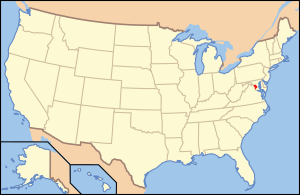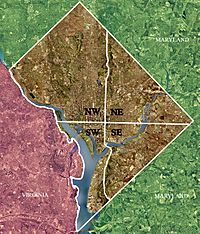District of Columbia voting rights facts for kids
Quick facts for kids
Voting rights in District of Columbia
|
|
|---|---|
 |
|
| Demographics | |
| Minimum voting age | 18 |
| Preregistration age | 16 |
| Felon voting status | No prohibition |
| Voter registration | |
| Voter registration required | Yes |
| Online voter registration | Yes (since 2015) |
| Automatic voter registration | Yes (since 2018) |
| Same-day registration | Yes |
| Partisan affiliation | Yes |
| Voting process | |
| In-person early-voting status | seven days prior |
| Postal ballot status | Yes (up to 15 days prior) |
| Straight-ticket device status | No |
| Election method | First-past-the-post (plurality) |
| Voter powers | |
| Ballot question rights | initiative and veto referendum |
| Recall powers | For all local officials, except for the district delegate; incumbent may not be recalled during first and last years in office |
| Federal representation level | Territory-level |
The voting rights of people in the District of Columbia are different from those in the 50 U.S. states. The U.S. Constitution says that each state gets to have voting members in both parts of the United States Congress. These parts are the House of Representatives and the Senate.
However, District of Columbia is the nation's capital. It is a special federal district, not a state. Because of this, D.C. does not have full voting power in Congress. The Constitution gives Congress special control over the District.
In the House of Representatives, D.C. has a delegate. This delegate can vote on some rules and in special groups called committees. But they cannot vote on new laws on the main House floor. People living in D.C. do not have any voting members in the Senate.
In 1961, the Twenty-third Amendment was added to the Constitution. This amendment lets D.C. have votes in the Electoral College. This means D.C. residents can vote for the President and Vice President. They get the same number of electoral votes as the state with the fewest people.
The fact that D.C. does not have full voting power in Congress has been a topic of discussion for a long time. Many ideas have been suggested to change this. These ideas include making new laws or changing the Constitution. Some have even suggested giving D.C. back to Maryland. Another idea is to make D.C. a new state. So far, none of these ideas have fully changed D.C.'s representation in Congress.
Contents
Why D.C. Voting Rights Matter
People have different ideas about whether the District of Columbia should have full voting power in Congress.
Arguments for D.C. Voting
Many people believe that D.C. residents should have the same voting rights as people in states. There are about 672,228 people living in D.C. They are U.S. citizens and pay taxes. Supporters say these citizens should have a say in how their government works. They feel it is unfair that D.C. residents do not have full voting representation.
Arguments Against D.C. Voting
Others argue that giving D.C. full voting rights might go against the Constitution. The Constitution talks about states electing senators and representatives. Since D.C. is not a state, some believe it cannot have the same voting rights. They point out that the Constitution was written when D.C. was created as a federal district.
Politics and D.C. Representation
Over the years, many bills have been proposed in Congress. These bills aim to give D.C. voting power in the House or Senate, or both.
Some people who do not support D.C. voting rights say the District is too small. They argue it does not need full representation. However, supporters point out that states like Wyoming and Vermont have fewer people than D.C. Yet, these states have full voting power in Congress.
In recent times, most people in D.C. vote for the Democratic Party. This has led to political arguments. Democrats often support giving D.C. more representation. Republicans often oppose it. Some say these positions are based on what helps each party politically.
Human Rights and D.C. Voting
International groups have also looked at D.C.'s voting rights.
Since 2006, the United Nations Human Rights Committee has said that the U.S. is not giving D.C. residents full voting rights. They believe this goes against a treaty called the International Covenant on Civil and Political Rights. The U.S. agreed to this treaty in 1992.
In 2015, D.C. joined the Unrepresented Nations and Peoples Organization. This group helps people and areas that do not have a voice in their national governments.
Ideas for Change
People who want D.C. to have more voting rights have suggested several ways to make this happen.
One main idea is to treat D.C. more like a state. This could mean making it the 51st state. Another idea is to let Maryland take back the land it gave to create the District. This would make D.C. part of Maryland again.
 | Madam C. J. Walker |
 | Janet Emerson Bashen |
 | Annie Turnbo Malone |
 | Maggie L. Walker |


